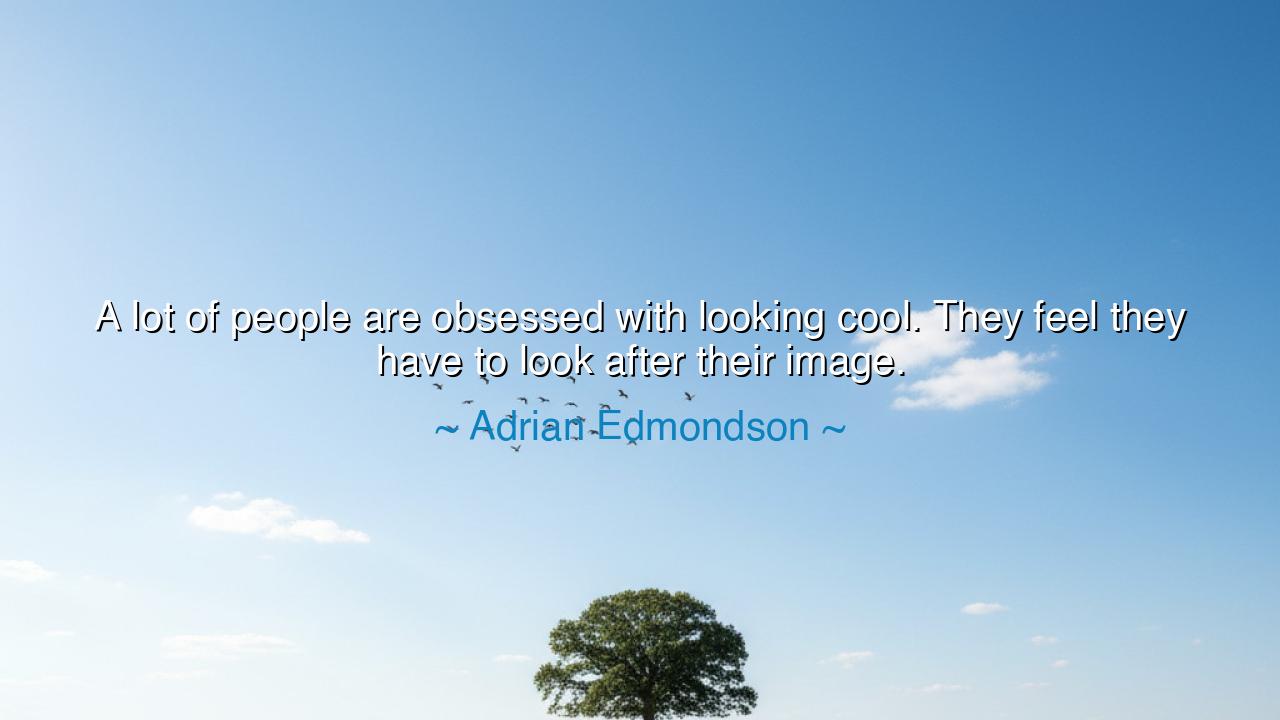
A lot of people are obsessed with looking cool. They feel they
A lot of people are obsessed with looking cool. They feel they have to look after their image.






"A lot of people are obsessed with looking cool. They feel they have to look after their image." These words by Adrian Edmondson shine a light on a pervasive aspect of modern society: the overwhelming desire to conform to an image that others find appealing. This obsession with coolness and appearance often drives individuals to carefully construct a persona—a false self—that is more about external validation than true authenticity. Edmondson’s insight challenges us to consider the price of maintaining such an image, and to ask ourselves whether this preoccupation with outward perception detracts from our inner fulfillment. In a world that often prizes style over substance, the idea of looking after one’s image can quickly become a hollow pursuit.
In the ancient world, the concept of image was not new, though it may have been expressed differently. The Greeks, for instance, admired beauty and grace, often embodied in their gods and heroes. However, their understanding of beauty was linked to the idea of virtue and wisdom. Plato believed that true beauty was not just physical appearance, but the expression of goodness, wisdom, and harmony. His famous Allegory of the Cave suggested that those who sought beauty only in the material world were blind to the higher forms of truth and knowledge. The Greeks understood that while appearance may captivate the eyes, it is the soul—the character—that defines true worth. Edmondson’s words resonate with this ancient wisdom, suggesting that an obsession with image ultimately ignores what is of real value.
Similarly, the Romans were no strangers to the pursuit of status and appearance, but they also understood the dangers of excessive vanity. Cicero, the great Roman orator, warned against self-obsession, advocating for a life of virtue and service to the state over self-centered pursuits. To the Romans, true nobility came not from one’s outward appearance but from their actions, integrity, and contribution to society. The notion of caring for one’s image was, in their eyes, secondary to living a life of honor and dignity. Edmondson’s observation about the obsession with coolness in our times draws on this same ancient understanding: that true greatness is achieved not by external perceptions, but by internal values and authentic living.
In our modern world, this pursuit of image is not just about physical appearance, but about maintaining an identity that aligns with societal standards. Social media has amplified this desire, creating an environment where everyone is constantly curating their public persona. The pressure to appear “cool” or “successful” often leads individuals to project an image that is far removed from their true selves. Take the example of celebrities or influencers who maintain carefully constructed public images—often presenting an idealized version of themselves to the world. While this can lead to success and recognition, it can also foster anxiety, insecurity, and a loss of identity as these individuals become more focused on image management than personal growth or authentic relationships.
One person who embodies the contrast to this preoccupation with image is Mahatma Gandhi. Despite being a global figure with the power to influence millions, Gandhi maintained a life of simplicity and humility. His selfless actions and commitment to nonviolence were far more important to him than any image or reputation. Gandhi's life was a rejection of the societal urge to craft a perfect image and an embrace of the authenticity that comes from living in accordance with one’s values. He lived his life in such a way that he was not concerned with what others thought of him, but with what he could contribute to the betterment of society. His example serves as a powerful reminder that we find our true power not by cultivating an image, but by living with integrity and purpose.
The lesson that Edmondson’s quote imparts is that true coolness is not found in the careful construction of an image for the sake of others, but in the courage to be authentic—to embrace our true selves without the need for external validation. The ancient philosophers knew that when we prioritize external appearances over inner growth, we are left hollow. We become prisoners of social approval, forever chasing an image that is ultimately unfulfilling. True freedom lies in embracing who we are, flaws and all, and living in a way that aligns with our values and purpose.
In your own life, reflect on the ways you might be shaped by external expectations. Are you living in pursuit of approval, or are you embracing your authentic self, regardless of what others may think? True fulfillment comes not from looking cool but from being authentically yourself, unapologetically embracing your uniqueness and living with integrity. Let go of the need to fit into someone else’s mold and instead focus on developing a life that reflects your true character. When you stop worrying about image, you free yourself to live a life of true meaning and purpose—and that, in itself, is the coolest thing of all.






AAdministratorAdministrator
Welcome, honored guests. Please leave a comment, we will respond soon